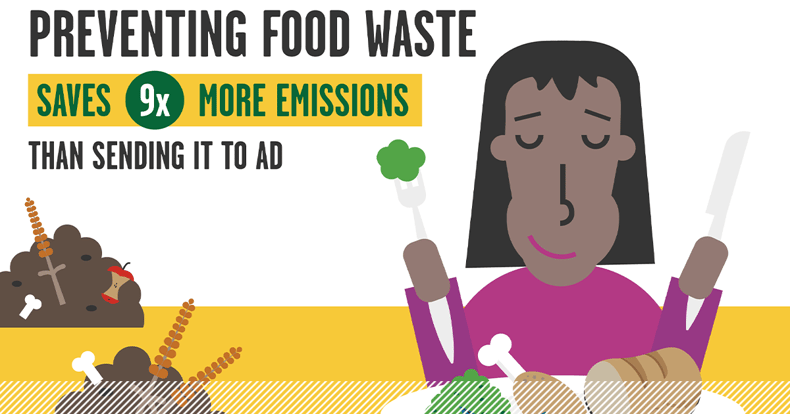New report: Anaerobic digestion is no silver bullet for food waste

If you want your work addressing food waste to have the biggest impact on greenhouse gas emissions, prevent food waste to begin with, don’t rely on anaerobic digesters to deal with it. That’s the finding from a new report from UK-based food systems research group Feedback Global.
The Feedback report, “Bad Energy: Defining the true role of biogas in a net zero future,” recommends a “prevention-first” approach to food waste, noting that prevention results in direct emissions reductions that are more than nine times greater when compared to sending the food waste to an anaerobic digester (AD). Similarly, the report notes that “if the grassland used to produce the meat and dairy that ends up as waste is instead afforested, emissions savings are on average 40 times higher than sending the same volume of food waste to AD.”
Leanpath’s focus has always been preventing the occurrence of food waste for maximum economic and societal benefit. This focus is aligned with EPA’s Food Recovery Hierarchy, which provides a framework of options to handle excess food resources from best to worst – starting with prevention (aka source reduction) and moving to food recovery for people, animals, and industrial uses, composting, and finally, landfill (the worst case option).
Prevention is at the top for very good reasons. By preventing the occurrence of food waste, we avoid all of the needless resource consumption and environmental impacts (such as greenhouse gas emissions) that would otherwise occur in the production and distribution of that food from farm to fork. And, significantly, we free up resources such as human capital and labor to address the root causes of social problems.
Feedback’s report provides further support for prioritizing prevention.
But AD isn’t the only downstream solution on the Food Recovery Hierarchy that can unwittingly be viewed as a panacea for the food waste challenge. For example, in their paper, "Foodservice Composting Crowds out Consumer Food Waste Reduction Behavior in a Dining Experiment," researchers at Ohio State University found that when diners were informed that their plate waste would be composted, their level of food waste was higher – presumably because they felt that there was environmental “good” coming from that waste.
As Feedback notes, biogas (one of the end products of AD) has long “been presented as a silver bullet for the climate crisis – but is often a sticking plaster holding up more fundamental change.” In other words, we can do better by preventing food waste in the first place rather than overproducing food with the intent to produce energy from the excess.
That “do better” mindset is the key.
To be clear, we’re not arguing against any downstream solution that can extract additional utility from existing food waste – for that “waste” (i.e. excess food) should really be viewed as a valuable resource to be harnessed for maximum societal benefit. In fact, Leanpath’s measurement-focused tools enable downstream solutions of the existing waste in foodservice operations as we work to continually reduce that volume over time through prevention. But while working to put wasted food to its best use in the immediate term, we should all challenge ourselves to work toward preventing its occurrence in the long term.
So we are completely supportive of Feedback’s “prevention-first” recommendation, which aligns with our longtime recommendation to shift conversation and focus on food waste up the Hierarchy to prevention, with a related food system emphasis on shifting to “responsible production” versus “overproduction” of food. And we applaud Feedback for conducting the research to educate food system stakeholders (that’s all of us) and guide policy for food waste reduction.
Let’s put our energy into prioritizing prevention of food waste, because our current cycle of overproduction and excessive waste is far too costly for people and the planet.
Sign up for our monthly newsletter in the footer below for the latest in
food waste prevention initiatives, best practices, webinars and more.
